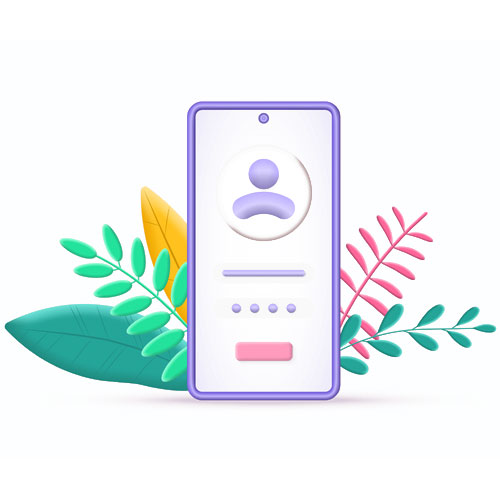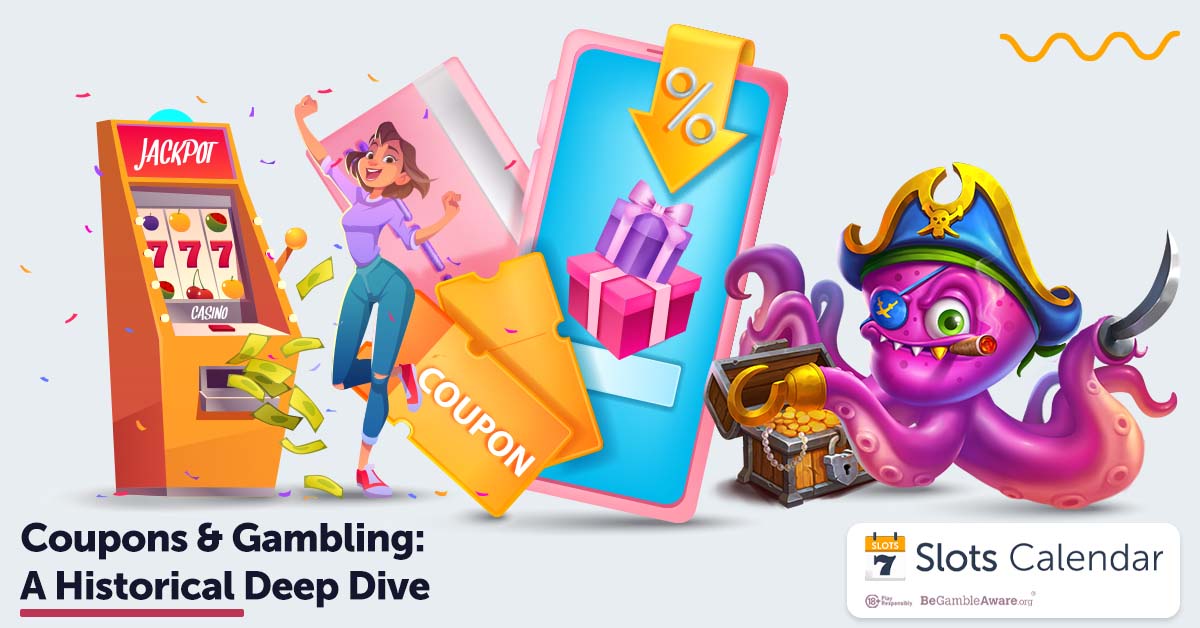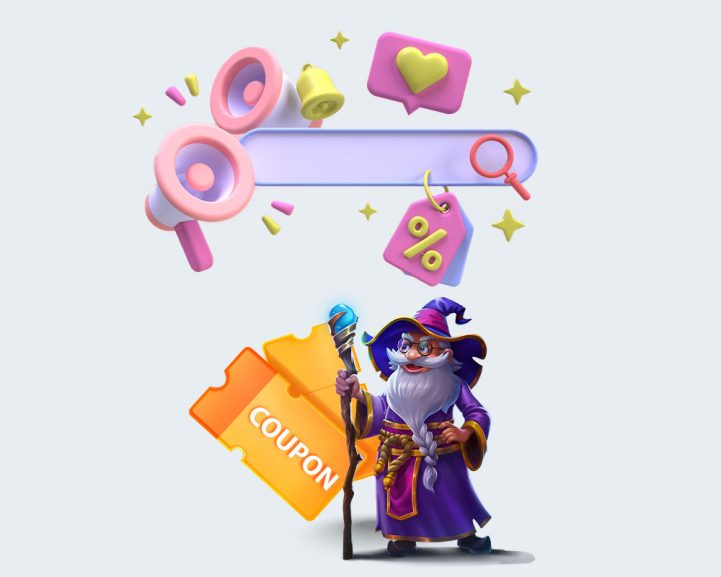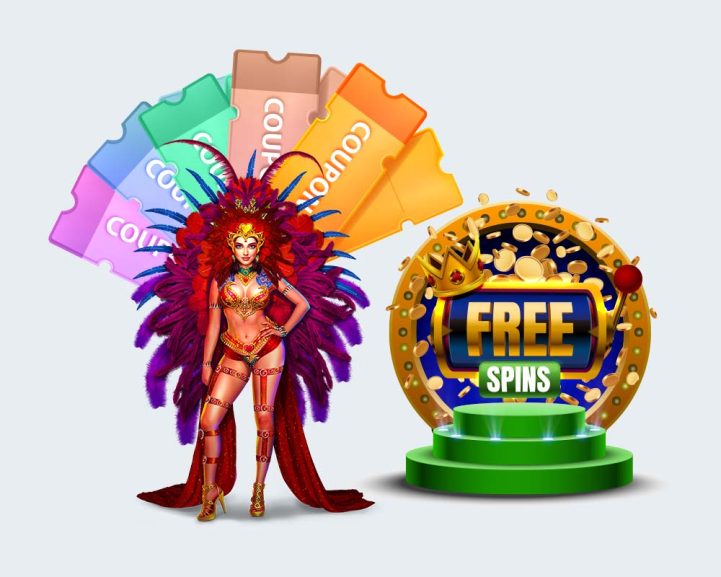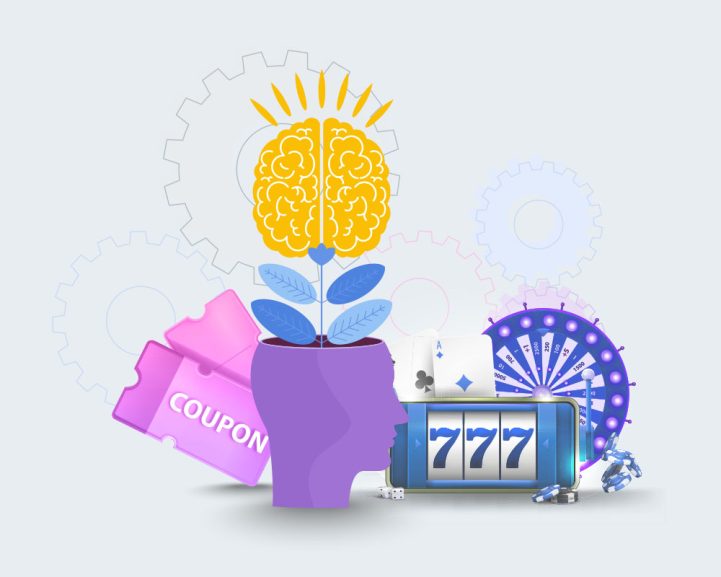Coupons have become a vital element of today’s consumer culture, tempting people with the promise of discounts, special deals, and cost-saving solutions. While we can’t deny their precedes in our everyday life, the story behind them is filled with history, economics, and a bit of psychology. That’s why, in this article, SlotsCalendar’s team will focus on coupons, giving you a complete breakdown of their history and how they work in different industries. So join us as we take a trip through time and explore the deep connection between coupons, psychology, and gambling.
What Are Coupons?
A coupon is a voucher or token that gives you, the customer, a special discount, deal, or offer when you’re buying something, whether it’s a product or a service.
Coupons are actually useful marketing tools different businesses use to attract potential buyers and make them come back for more.
Their main purpose divides into two as they give customers a little incentive to buy something and also give businesses a way to see how well their promotional campaigns are doing.
Coupons and Their Role
There are people that compare coupons with the siren’s song that used to lure sailors.
Similarly, these codes attract people with the promise of great deals.
Most businesses or companies use them to attract more people to their websites or stores.
While doing so, businesses boost their sales and highlight the products or services they want to offer.
Coupons act as a powerful catalyst, encouraging potential customers to take action by offering them an immediate benefit—be it a percentage off the total purchase, a buy-one-get-one-free deal, or a free gift with purchase.
Different Forms of Coupons
If you’re curious about coupons, you should know that they come in different forms to suit new technologies and also people’s preferences.
Traditional paper coupons, once a staple in newspapers and magazines, have evolved into a digital phenomenon.
Online coupon codes are now common, allowing customers to apply discounts during their online shopping experience.
On top of that, companies that developed mobile apps and loyalty programs have revolutionised the coupon game with personalised offers that suit the customer’s habits.
The Importance of Discounts and Cost-Saving Measures
In today’s world, where people cautiously think about how to spend every penny, coupons have become a lifeline. That’s because people think that coupons help them spend their money wisely.
People should be aware of how important discounts and the other ways to save money on costs really are.
Somehow, coupons give people the power to buy things they might have skipped due to a tight budget. With the help of promo codes, people can actually get the products or experiences they wanted in the first place.
Promotional codes also cater to the thrill of getting a good deal—the exhilaration that comes from knowing you’ve secured a product or service at a lower price.
The feeling of achievement makes the whole shopping experience even better and makes the bond between shoppers and the brand stronger.
Moreover, nowadays, where we’re all about getting the things we want right away, coupons give us those instant rewards that we need for quick validation.
History of Coupons
In 1887, Asa Candler, a prominent Atlanta businessman and co-owner of the Coca-Cola Company, introduced a groundbreaking marketing strategy.
Chandler came up with a brilliant idea that would revolutionise the world. He created the very first coupon. The purpose of this clever code was to spread the word about his new invention, the Coca-Cola drink.
This creative strategy of his also includes giving coupons that people could use to get a free drink. The idea really caught up, and everyone was really excited.
As Chandler’s smart ideas became so popular, they had much bigger impacts than he probably expected back then.
This transformational idea took Coca-Cola, once a relatively insignificant tonic, and elevated it to market dominance.
Although most of these initial hand-written coupons were distributed throughout the streets of Atlanta, a portion also found their way into magazines and were even sent via mail.
Within a mere two decades, an astounding 8.5 million consumers had redeemed these coupons, a testament to the resounding success of Candler’s brainchild.
Coupons: A Timeline
In 1887, Coca-Cola introduced the concept of coupons. These initial hand-written paper coupons were valued at 5 cents each and granted customers a complimentary Coca-Cola drink.
This pioneering strategy by Coca-Cola achieved remarkable success, with around 8.5 million drinks distributed until 1913, resulting in nationwide coverage across the United States.
Moving ahead to 1909, CW Post utilised 1-cent coupons to promote the sale of Grape-Nuts breakfast cereal.
In 1930, using coupons became even more popular, especially during the tough times of the Great Depression.
By 1957, the demand for coupons continued to surge, culminating in the establishment of the Nielsen Coupon Clearing House. This centralised entity streamlined coupon processing and redemption.
Moving forward to the 1980s, coupons became popular in various fields, including gambling.
High-end casinos introduced customer loyalty cards as an alternative to traditional one-time discounts, specifically catering to an esteemed clientele.
As the 2000s arrived, the concept of coupons seamlessly transitioned into online gambling, propelling substantial growth within the industry.
Finally, in 2010, the extreme couponing’ trend became extremely popular, catching everyone’s attention. This trend inspired people to collect coupons, create strategies for spending them wisely and use them accordingly.
Industries Using Coupons
Coupons are not available only in a single area, people can use them for different industries. Whether we talk about established businesses or online ones, consumers can use promotional codes either way.
As mentioned earlier, coupons have become useful marketing tools, and they are an essential part of any business. Their aim is to attract new customers, increase sales, and also build strong connections between the brand and the clients.
Thus, this paragraph is going to highlight a few important industries that use coupons and bring success.
- Retail Industry: Coupons drive foot traffic and sales by offering discounts, buy-one-get-one deals, and limited-time offers.
Stores and shops send coupons through email, newspapers, and online platforms to get people interested in checking out what they have to offer. While doing so, they can also discover other things they’d like to buy.
- Food and Beverage Industry: Restaurants use coupons to showcase unique dishes, mark milestones, and boost business during off-peak hours.
These codes provide significant discounts, which can make dining out more affordable.
- Travel and Hospitality Sector: Coupons are used to make travel experiences more accessible.
For example, these deals can cut prices on hotel stays, plane tickets, or holiday experiences.
They will encourage you to try new adventures or treat yourself to some luxury experiences that you’ve never considered before.
- Online Businesses: Digital coupons and promo codes have transformed the e-commerce landscape.
Basically, these codes offer instant price drops when you’re paying online.
This allows online shops to customise deals according to your preferences and spending habits.
- Entertainment and Services: Coupons enhance intangible experiences, such as discounted movie tickets, spa treatments, and casino bonuses.
They offer an easy way to enjoy free time, try new hobbies, and have fun with different entertainment options that we might have missed otherwise.
The Link Between Coupons and Gambling
Coupons and gambling, on the surface, appear to cater to distinct desires – the former seemingly appeals to the rational, thrifty side of individuals seeking economic benefits.
At the same time, the latter tends to attract risk-taking enthusiasts enticed by the allure of uncertain gains.
However, delving deeper, one can discern a remarkable convergence in the psychological triggers that underlie both these activities.
Shared Psychological Triggers
At the heart of both coupon usage and gambling lies a shared set of psychological triggers that captivate individuals’ attention and drive their behaviour.
These triggers cover plenty of feelings like looking forward to something happening, excitement, and the idea of getting something of value.
Both activities have the power to create a sense of anticipation as individuals await the outcome – be it a discounted purchase or a triumphant win.
Behavioral Economics Ideas
In order to better understand the connection between coupons and gambling, we can take a look at the perspective of behavioural economics.
This field explores the ways our minds, emotions, and behaviour work and shape our economic choices.
One such concept that binds these two activities is the interplay of risk and reward.
In gambling, the excitement of possibly winning the jackpot frequently outweighs the rational evaluation of odds. This underscored the human behaviour to follow our emotions rather than listen to our logic.
Similarly, when individuals utilise coupons, they often perceive themselves as gaining more value than they are losing, tapping into the innate human inclination towards maximising benefits.
Thrill of Saving vs Thrill of Winning
Perhaps the most striking parallel between coupons and gambling lies in the emotional experience they provide.
Coupon users experience a distinct thrill when they see their total purchase cost reduced, effectively saving money on items they would have bought anyway.
On the other hand, the excitement of winning really captivates gamblers. Whether we’re talking about a great poker hand, hitting the jackpot on slot machines, or winning a bet, the adrenaline is there to boost our feelings.
This adrenaline rush comes from not knowing what’s about to happen next and the chance of getting a surprise win.
Different Types of Gambling Coupons
The realm of gambling is not only characterised by its diverse array of games and betting options but also by the creative utilisation of coupons that heighten the overall experience for participants.
These coupons work like rewards, adding a bit of spice to the overall game and giving players the opportunity to boost their wins or cut down their losses. Here are the most common types of casino bonus codes or coupons:
- Casino Coupons: Casinos, both brick-and-mortar and online, employ a range of coupons to entice and engage their patrons.
Free play vouchers, for instance, grant players a set amount of complimentary credits to use on various games, giving them a chance to explore without immediate financial risk.
- Sports Betting Coupons: Free bets allow players to place wagers without using their funds, allowing them to experiment with new strategies or test their intuition.
Risk-free bets ensure that if a player’s initial bet doesn’t pan out, they’ll receive their stake back as a coupon to try again.
- Lottery Coupons: Even lotteries have embraced the concept of coupons.
Participants can find discounts on multiple ticket purchases, incentivising them to buy more entries for a particular draw.
- Bingo and Poker Coupons: Bingo halls and poker rooms also utilise coupons to cater to their audiences.
Entry fee discounts for bingo sessions or poker tournaments encourage players to participate more frequently.
Psychology Behind Gambling Coupons
If we think about it, the way psychology and gambling connect is pretty complex, especially when we talk about bonus codes that impact the way we react and act.
To explain better, picture this: Our brains have these things called cognitive biases, like the anchoring effect, that play a role in how those coupons affect our choices.
This means that the first offer sets the tone for how we judge the bets we make afterwards.
The fear of missing out (FOMO) drives both coupon use and gambling participation due to time-sensitive opportunities and the anticipation of wins.
Do you know that feeling people get when they are more scared of losing than they’re excited about winning? That feeling comes into play when you’re about to use coupons affecting the way you act in gambling.
It’s actually like this feeling drives people to use coupons so they don’t miss out on saving money. That’s also what makes gamblers keep on betting to try and make up for the losses they’ve had.
All these psychological factors together shape how people make choices and interact with gambling.
Ethical Considerations
When it comes to gambling coupons, it’s important to use them in a responsible way. This will ensure the fact that people stay safe and avoid potential harm.
Using coupons in gambling can raise some ethical questions, especially when it comes to players who may be more prone to be addicted.
That’s why online casino operators should be aware of:
- Responsible Use and Potential Harm: The responsible use of coupons and gambling offers is paramount to safeguard players from falling into harmful patterns of behaviour.
- Addressing Vulnerability: It’s essential to recognise that specific individuals may be more prone to addictive behaviours, and the intersection of gambling coupons can exacerbate their vulnerability.
- Setting Limits and Seeking Help: To make sure gambling codes don’t have a negative impact, it’s best for players to set clear rules by themselves. This means that they have to set limits on how to use codes in gambling activities.
Conclusion
In a world characterised by consumerism and the quest for excitement, coupons have transformed into more than just physical or digital tokens.
From their historical origins to their current prominence, coupons have consistently evolved to align with the changing commerce landscape and consumer tendencies.
As you can see in this article, we took a closer look at all the different industries that use coupons, and it’s quite fascinating how they manage to grab everyone’s attention.
Their ability to get people involved and give them rewards regardless of the industry is something pretty unique.
Whether embracing discounts or testing our fortunes, delving into the realm of coupons and their link to gambling illuminates the intricate interplay between human behaviour and economics.

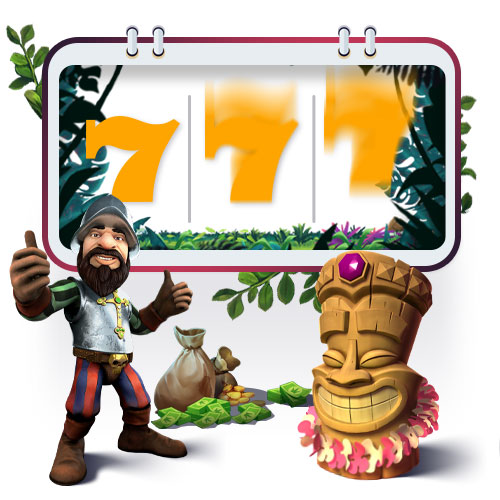 Free Slots
Free Slots



